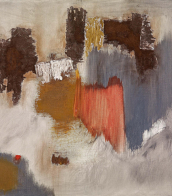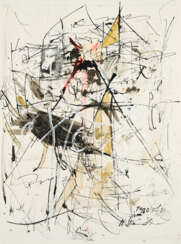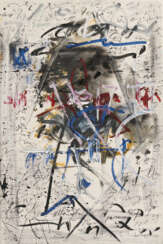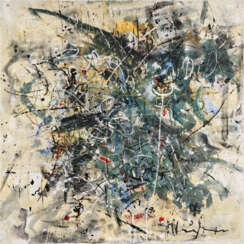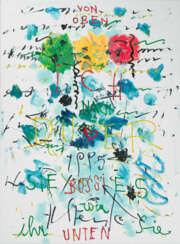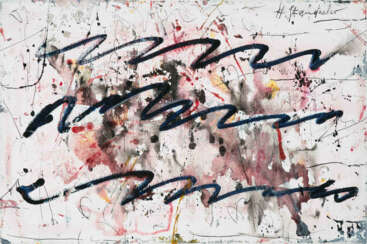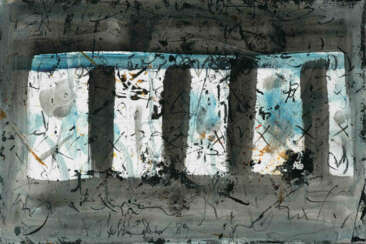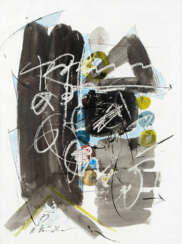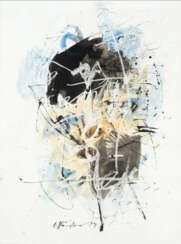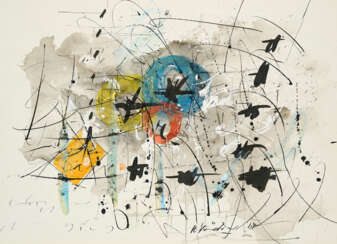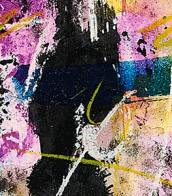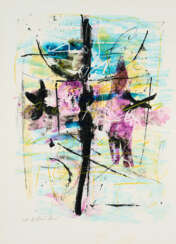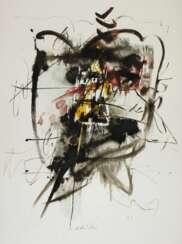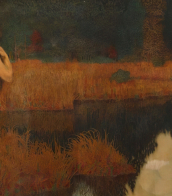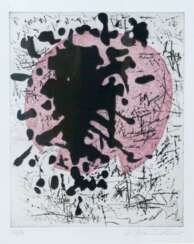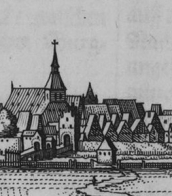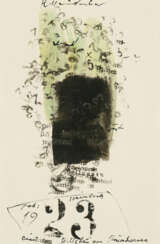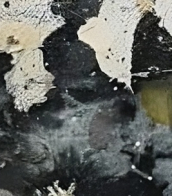hans staudacher (1923 - 2021)
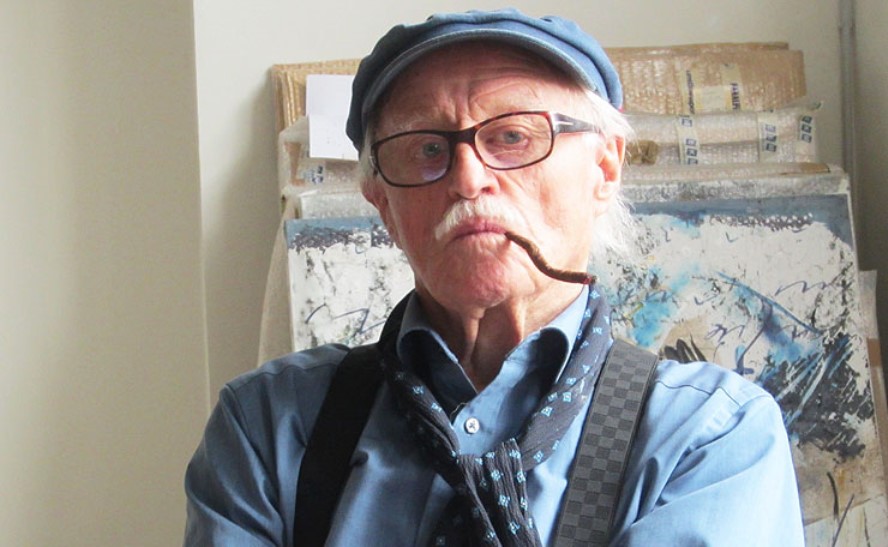
Hans Staudacher is an Austrian avant-garde painter.
At first he studied painting on his own, then attended a school of painting in Carinthia, where he began to create small format abstract works in gray-black tones. Subsequently, the artist moved to Vienna, where he painted already larger multicolored paintings. He soon became a member of the Vienna Secession; his exhibitions at the Informel were groundbreaking in Austria at the time.
Between 1954 and 1962 he traveled repeatedly to Paris, where he began to study the arts of Tachisme (or Art-Informel) and Lettrisme. These two elements shaped Hans Staudacher's later artistic legacy. Beginning in the 1960s, his work moved into an abstract style, and these works are a unique combination of lyrical informel art and abstract expressionism.
Staudacher is the founder of the Austrian organization Art Informel. Hans Staudacher was awarded the title of professor in 1976. Among his many awards are the Grand Prize of the Tokyo Biennale in 1965, the Cultural Award of the Province of Carinthia in 1989, and the Golden Honor of the City of Vienna in 2004.
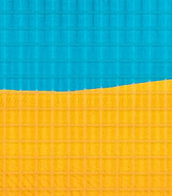

Hans Staudacher is an Austrian avant-garde painter.
At first he studied painting on his own, then attended a school of painting in Carinthia, where he began to create small format abstract works in gray-black tones. Subsequently, the artist moved to Vienna, where he painted already larger multicolored paintings. He soon became a member of the Vienna Secession; his exhibitions at the Informel were groundbreaking in Austria at the time.
Between 1954 and 1962 he traveled repeatedly to Paris, where he began to study the arts of Tachisme (or Art-Informel) and Lettrisme. These two elements shaped Hans Staudacher's later artistic legacy. Beginning in the 1960s, his work moved into an abstract style, and these works are a unique combination of lyrical informel art and abstract expressionism.
Staudacher is the founder of the Austrian organization Art Informel. Hans Staudacher was awarded the title of professor in 1976. Among his many awards are the Grand Prize of the Tokyo Biennale in 1965, the Cultural Award of the Province of Carinthia in 1989, and the Golden Honor of the City of Vienna in 2004.
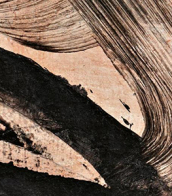

Hans Staudacher is an Austrian avant-garde painter.
At first he studied painting on his own, then attended a school of painting in Carinthia, where he began to create small format abstract works in gray-black tones. Subsequently, the artist moved to Vienna, where he painted already larger multicolored paintings. He soon became a member of the Vienna Secession; his exhibitions at the Informel were groundbreaking in Austria at the time.
Between 1954 and 1962 he traveled repeatedly to Paris, where he began to study the arts of Tachisme (or Art-Informel) and Lettrisme. These two elements shaped Hans Staudacher's later artistic legacy. Beginning in the 1960s, his work moved into an abstract style, and these works are a unique combination of lyrical informel art and abstract expressionism.
Staudacher is the founder of the Austrian organization Art Informel. Hans Staudacher was awarded the title of professor in 1976. Among his many awards are the Grand Prize of the Tokyo Biennale in 1965, the Cultural Award of the Province of Carinthia in 1989, and the Golden Honor of the City of Vienna in 2004.


Hans Staudacher is an Austrian avant-garde painter.
At first he studied painting on his own, then attended a school of painting in Carinthia, where he began to create small format abstract works in gray-black tones. Subsequently, the artist moved to Vienna, where he painted already larger multicolored paintings. He soon became a member of the Vienna Secession; his exhibitions at the Informel were groundbreaking in Austria at the time.
Between 1954 and 1962 he traveled repeatedly to Paris, where he began to study the arts of Tachisme (or Art-Informel) and Lettrisme. These two elements shaped Hans Staudacher's later artistic legacy. Beginning in the 1960s, his work moved into an abstract style, and these works are a unique combination of lyrical informel art and abstract expressionism.
Staudacher is the founder of the Austrian organization Art Informel. Hans Staudacher was awarded the title of professor in 1976. Among his many awards are the Grand Prize of the Tokyo Biennale in 1965, the Cultural Award of the Province of Carinthia in 1989, and the Golden Honor of the City of Vienna in 2004.
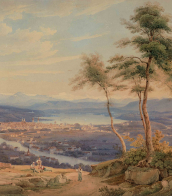

Hans Staudacher is an Austrian avant-garde painter.
At first he studied painting on his own, then attended a school of painting in Carinthia, where he began to create small format abstract works in gray-black tones. Subsequently, the artist moved to Vienna, where he painted already larger multicolored paintings. He soon became a member of the Vienna Secession; his exhibitions at the Informel were groundbreaking in Austria at the time.
Between 1954 and 1962 he traveled repeatedly to Paris, where he began to study the arts of Tachisme (or Art-Informel) and Lettrisme. These two elements shaped Hans Staudacher's later artistic legacy. Beginning in the 1960s, his work moved into an abstract style, and these works are a unique combination of lyrical informel art and abstract expressionism.
Staudacher is the founder of the Austrian organization Art Informel. Hans Staudacher was awarded the title of professor in 1976. Among his many awards are the Grand Prize of the Tokyo Biennale in 1965, the Cultural Award of the Province of Carinthia in 1989, and the Golden Honor of the City of Vienna in 2004.


Hans Staudacher is an Austrian avant-garde painter.
At first he studied painting on his own, then attended a school of painting in Carinthia, where he began to create small format abstract works in gray-black tones. Subsequently, the artist moved to Vienna, where he painted already larger multicolored paintings. He soon became a member of the Vienna Secession; his exhibitions at the Informel were groundbreaking in Austria at the time.
Between 1954 and 1962 he traveled repeatedly to Paris, where he began to study the arts of Tachisme (or Art-Informel) and Lettrisme. These two elements shaped Hans Staudacher's later artistic legacy. Beginning in the 1960s, his work moved into an abstract style, and these works are a unique combination of lyrical informel art and abstract expressionism.
Staudacher is the founder of the Austrian organization Art Informel. Hans Staudacher was awarded the title of professor in 1976. Among his many awards are the Grand Prize of the Tokyo Biennale in 1965, the Cultural Award of the Province of Carinthia in 1989, and the Golden Honor of the City of Vienna in 2004.


Hans Staudacher is an Austrian avant-garde painter.
At first he studied painting on his own, then attended a school of painting in Carinthia, where he began to create small format abstract works in gray-black tones. Subsequently, the artist moved to Vienna, where he painted already larger multicolored paintings. He soon became a member of the Vienna Secession; his exhibitions at the Informel were groundbreaking in Austria at the time.
Between 1954 and 1962 he traveled repeatedly to Paris, where he began to study the arts of Tachisme (or Art-Informel) and Lettrisme. These two elements shaped Hans Staudacher's later artistic legacy. Beginning in the 1960s, his work moved into an abstract style, and these works are a unique combination of lyrical informel art and abstract expressionism.
Staudacher is the founder of the Austrian organization Art Informel. Hans Staudacher was awarded the title of professor in 1976. Among his many awards are the Grand Prize of the Tokyo Biennale in 1965, the Cultural Award of the Province of Carinthia in 1989, and the Golden Honor of the City of Vienna in 2004.


Hans Staudacher is an Austrian avant-garde painter.
At first he studied painting on his own, then attended a school of painting in Carinthia, where he began to create small format abstract works in gray-black tones. Subsequently, the artist moved to Vienna, where he painted already larger multicolored paintings. He soon became a member of the Vienna Secession; his exhibitions at the Informel were groundbreaking in Austria at the time.
Between 1954 and 1962 he traveled repeatedly to Paris, where he began to study the arts of Tachisme (or Art-Informel) and Lettrisme. These two elements shaped Hans Staudacher's later artistic legacy. Beginning in the 1960s, his work moved into an abstract style, and these works are a unique combination of lyrical informel art and abstract expressionism.
Staudacher is the founder of the Austrian organization Art Informel. Hans Staudacher was awarded the title of professor in 1976. Among his many awards are the Grand Prize of the Tokyo Biennale in 1965, the Cultural Award of the Province of Carinthia in 1989, and the Golden Honor of the City of Vienna in 2004.


Hans Staudacher is an Austrian avant-garde painter.
At first he studied painting on his own, then attended a school of painting in Carinthia, where he began to create small format abstract works in gray-black tones. Subsequently, the artist moved to Vienna, where he painted already larger multicolored paintings. He soon became a member of the Vienna Secession; his exhibitions at the Informel were groundbreaking in Austria at the time.
Between 1954 and 1962 he traveled repeatedly to Paris, where he began to study the arts of Tachisme (or Art-Informel) and Lettrisme. These two elements shaped Hans Staudacher's later artistic legacy. Beginning in the 1960s, his work moved into an abstract style, and these works are a unique combination of lyrical informel art and abstract expressionism.
Staudacher is the founder of the Austrian organization Art Informel. Hans Staudacher was awarded the title of professor in 1976. Among his many awards are the Grand Prize of the Tokyo Biennale in 1965, the Cultural Award of the Province of Carinthia in 1989, and the Golden Honor of the City of Vienna in 2004.
